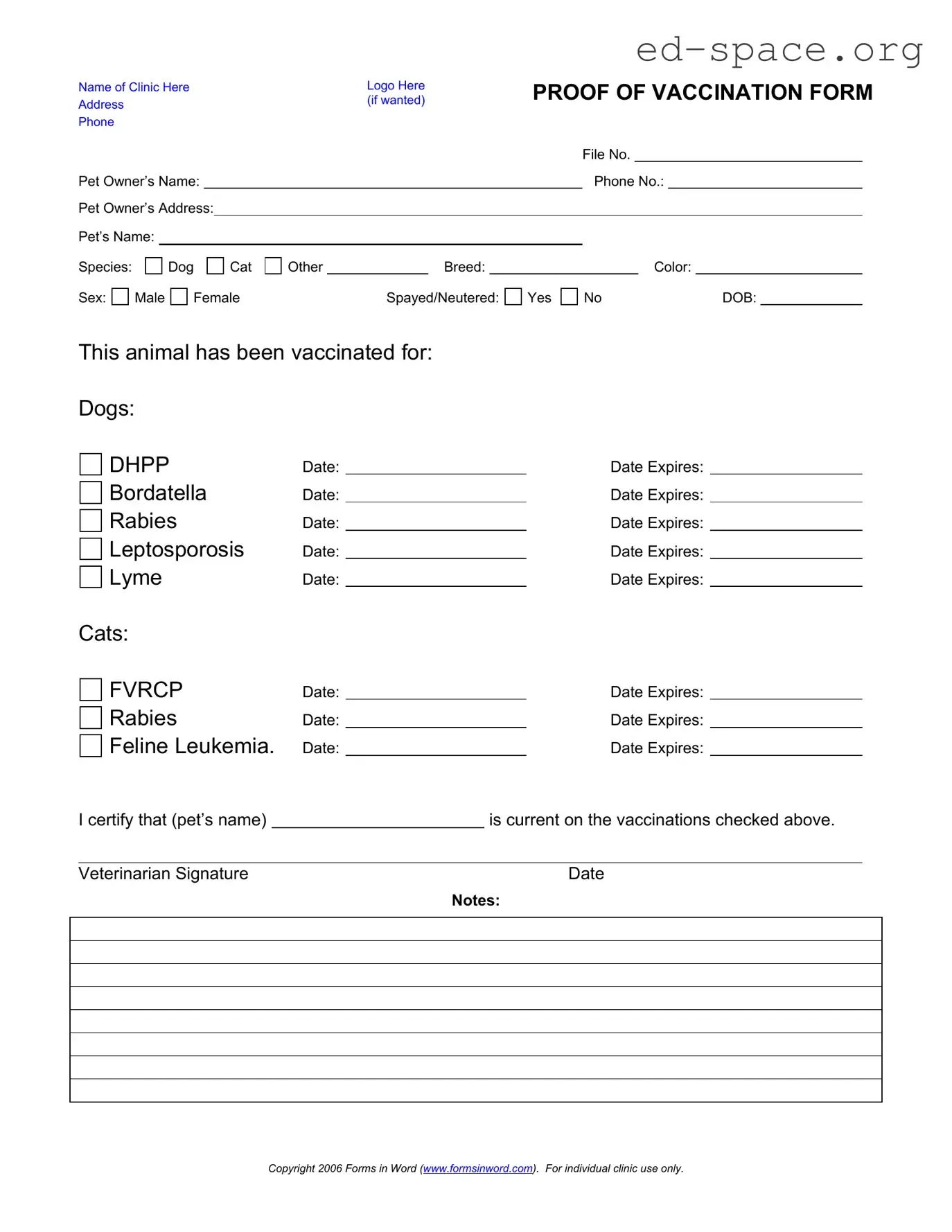What is a Proof of Vaccination Dog form?
A Proof of Vaccination Dog form is an official document provided by a veterinary clinic that verifies a dog has received its required vaccinations. The form includes the clinic's information, the pet owner's details, the dog's identification, and a list of vaccinations received, along with their administration and expiration dates. It's signed by the veterinarian, certifying the dog's vaccination status.
Why is it important to have a Proof of Vaccination Dog form?
This form is crucial for several reasons. It serves as a record that your dog has been immunized against certain diseases, which is important for their health and the health of other animals and people. It may be required for dog boarding, grooming services, training classes, or when traveling with your pet. It also ensures compliance with local laws regarding pet vaccinations.
What vaccines are listed on the Dog Proof of Vaccination form?
Typically, the form includes the DHPP (Distemper, Hepatitis, Parvovirus, Parainfluenza), Bordetella, Rabies, Leptospirosis, and Lyme vaccines. Each listed vaccine has spaces to record the date given and the expiration date, providing a complete immunization schedule for the dog.
How can I obtain a Proof of Vaccination Dog form?
This form is issued by veterinary clinics after administering vaccines to a dog. After your dog receives a vaccine, request this document from your vet. If it's not offered, don't hesitate to ask for it, as it’s your right and responsibility as a pet owner to have this record.
Is the Proof of Vaccination Dog form the same for all dogs?
Yes, the form's structure is standard, detailing the clinic and owner information, the dog's details, and the vaccination records. However, the vaccines listed might vary based on the dog’s specific healthcare plan, as determined by the veterinarian.
What should I do if I lose my dog's Proof of Vaccination form?
If you lose the form, contact your veterinary clinic to request a duplicate. It's essential to keep this document in a safe place, but clinics usually keep a record of vaccinations and can issue a new form when necessary.
Can I use this form for dogs and cats?
While the template may accommodate both dogs and cats by including a section for cat vaccines (FVRCP, Rabies, and Feline Leukemia), ensure you're using the correct section relevant to your pet. The form is designed to be versatile, but correct information pertaining to your pet’s species is crucial.
Is there an expiration date for the vaccinations listed on the form?
Yes, each vaccine listed on the form includes a space for the date the vaccine was administered and its expiration date. This information is critical for keeping track of when your dog needs booster shots or re-vaccination.
How does the veterinarian certify the Proof of Vaccination form?
The form is certified by the veterinarian's signature, along with the date of signing. This official endorsement confirms that the information is accurate and the dog has received the vaccinations listed on the form.
Can I create a digital copy of the Proof of Vaccination Dog form?
Creating a digital copy of this document is highly recommended. It ensures you have a backup if the original is lost or damaged. You can scan the document or ask your veterinarian if a digital copy can be provided or stored in their online system for easy access.

